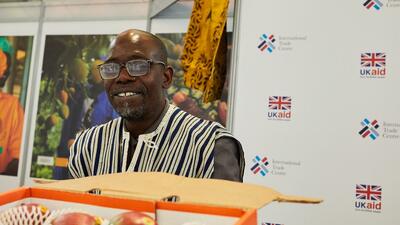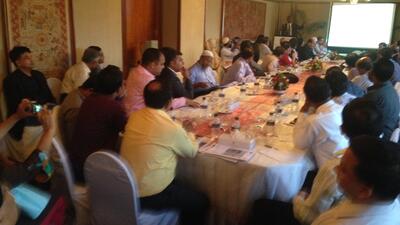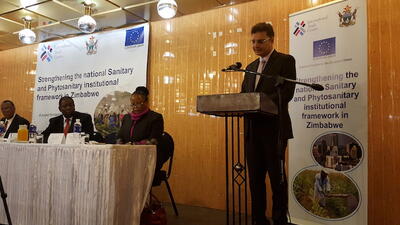
Reviving Zimbabwe’s leather sector
Until 2000, Zimbabwe produced 17 million pairs of leather shoes per year and had a vibrant leather industry composed of highly skilled small and medium-sized enterprises (SMEs), including livestock farmers, hides collectors, tanning and manufacturing. In 2011, shoe production plummeted to 1 million due to ongoing crises, competition from lower quality imports in Zimbabwe and the region, as well as exports of hides and skins.
The trend is now being reversed, as a result of a project in the Common Market for Eastern and Southern Africa (COMESA) under ITC's Programme for Building Capacity for Trade (PACT II): SMEs in the leather sector in the region generated US$ 5 million in new export orders with another US$ 4.3 million under negotiation. In addition, tanners were able to deal directly with importers to eliminate intermediaries, leading to an increase in their profit margins from 3% to around 15%.
Under PACT II, funded by Canada, Zimbabwe was selected as a pilot country to implement the COMESA regional leather sector strategy at the national level, and the industry has come together to plan the revival after the shutdown of many enterprises.
The Zimbabwe leather industry strategy is built upon a public-private partnership supported by ITC, the COMESA Leather and Leather Product Institute (LLPI) and the government of Zimbabwe.
'If all the raw hides and skins are transformed into finished goods, COMESA's leather industry would balloon to US$ 2.5 billion from the present value of US$ 450 million,' said COMESA Secretary-General Sindiso Ngwenya.
The objective of Zimbabwe's leather strategy is to transform the industry into a vibrant and internationally competitive sector, contributing to sustainable development through value addition and an increase in the exports of finished goods. This is expected to result in a five-fold increase in the sector's total sales to US$ 116 million.
Transforming the industryThe strategy will help to create jobs and generate income by supporting micro enterprises and SMEs. It also advocates generating service centres for SME clusters manufacturing shoe and shoe components to increase competitiveness and diversify markets.
Industry and Commerce Minister Welshman Ncube said the strategy supports the government's vision to transform Zimbabwe from 'a producer of primary goods into a producer of processed, value-added goods for domestic and export markets'.
This approach called for the creation of a stakeholder-led sector value chain council, which serves as a public-private platform to set business priorities and seek support from government and development partners.
A market-led approachThe sector assessment involved more than 130 industry stakeholders. Entrepreneurs participated in regional workshops, trade fairs, business tours and buyer-seller meetings. Participants analysed their interdependencies, examined common problems and agreed on objectives to strengthen competitiveness that responded to development and market priorities.
'ITC's role has been to ensure that the right market information and the right expertise were provided to the private sector, so that they could better decide what their priorities were to move the sector forward,' explained Hernan Manson, Associate Adviser for Value Chain Development at ITC.
At the heart of the project is the Strategy Coordinating Committee - a platform for public-private dialogue, problem solving and decision-making that brings together the private sector, trade support institutions and the government.
Bata Shoe Company, one of the country's largest manufacturers, and a committee coordinating member, is relying on more flexible production by outsourcing in tough economic times. While the national leather sector strategy was being developed, Bata's operations proved how industry players can work together.
Luis Pinto, Managing Director, decided to support former employees by leasing them machinery to produce leather uppers for shoes. Several have started their own SMEs, employing up to 40 workers. Now, the SMEs have reliable equipment and a steady buyer.
Pinto noted, 'Today, they work with us, but tomorrow they will work with the whole industry in this country.'
Rodrick Rutsvara, Managing Director of Rutsvara Shoe Company in Gweru, said progress is being made. 'Our relationship with Bata is growing bigger and bigger because we [have] a plan. Some of the shoes we supply to Bata; some to individuals.'
Addressing policy issuesAlthough the reasons for the downturn of Zimbabwe's leather sector are complex, the lack of raw materials and access to finance to buy raw materials and invest in upgrading technology were especially hindering competitiveness.
Hide collectors exported an estimated 63% of 388,000 hides, with no value added. This led to a serious shortage of raw material and forced half of the country's tanneries to shut down or incur debt to pay premium prices for hides. Out of nine tanneries, only four were reported to be operating in 2013.
Livestock farmers said there was no incentive to properly handle or sell the hides because they received as little as US$ 0.20 or up to US$ 1 per hide. The hides used to produce leather goods went to waste.
The export of raw hides seriously undermined the industry. Ncube noted, 'The average value of leather and leather products exported globally in 2010 was US$ 184 billion of which hides, skins and leather made up US$ 27 billion; 40% of the value was exotic leather. In 2011, 2.2 million pairs of [shoes] were produced while 4 million pairs of cheap synthetic shoes were imported, making us net importers of footwear.'
The leather strategy provided tailor-made support to SMEs and addressed their needs in the areas of quality control, packaging and manufacturing capacities, enabling them to meet the requirements of importing markets.
'The leather sector is one of the [country's] priorities sectors. ITC's programme delivered to our expectations - it was a good example of how government and the private sector can work together,' said Abigail Shoniwa, Permanent Secretary at the Ministry of Industry and Commerce.














